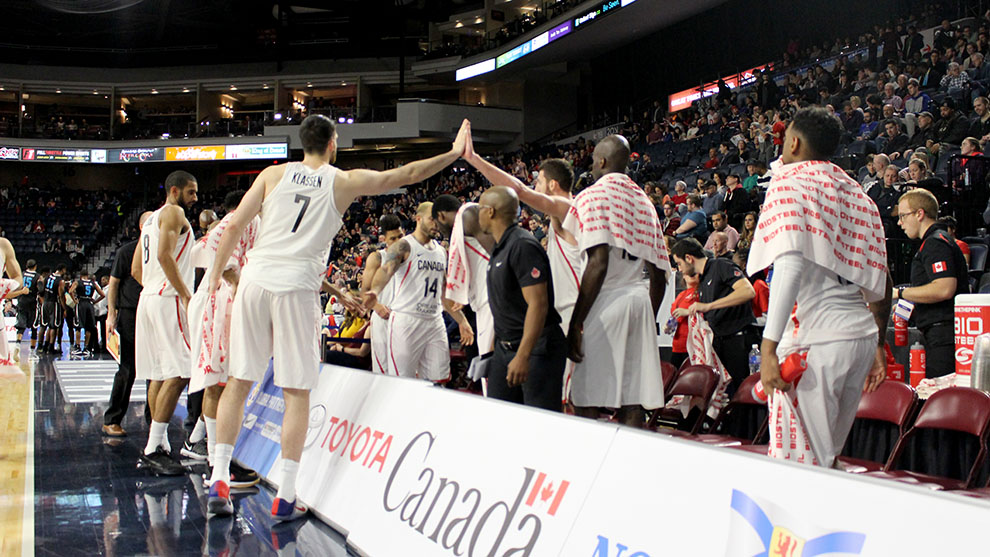Basketball
Team Canada Basketball comes to Halifax
Changes in FIBA tournament structure means games played coast-to-coast

caption
"Captain Canada" waving the Canada Basketball flag in the Scotiabank Centre.
caption
“Captain Canada” waving the Canada Basketball flag in the Scotiabank Centre.The last time a senior men’s FIBA (International Basketball Federation) game was played on Canadian soil was in 1994, when Toronto hosted the World Cup.
This changed Friday night.
Canada’s senior men’s national basketball team played against the Bahamas in a FIBA World Cup qualifying game at the Scotiabank Centre in Halifax.
David Wagg, executive director of Basketball Nova Scotia, was excited for the opportunity the game presented and said “having kids see that level of basketball is great.”
Tickets were sold out for the game, as more than 6,000 basketball players and fans of all ages were there as Canada beat the Bahamas 93-69.
Based on the crowds drawn to the Atlantic University Sport (AUS) basketball playoffs or the men’s national university basketball championship (the Final 8), selling out comes as no surprise. Basketball is a product Nova Scotians seem to buy-in to.
The province has had both individual and team success at multiple levels in basketball.
In 2016, both the U15 and U17 provincial basketball teams won national gold over Ontario.
Last year, individual Nova Scotians, Lindell Wigginton and Nate Darling, had international success on Canada’s U19 team, winning the nation’s first ever gold medal in international competition.
At the university level, Dalhousie University’s men’s basketball team is a top-10 program in the country and won bronze at nationals last year. This year, the Acadia University Axemen have slid into Canada’s top-10 too, while the Axewomen are the top team in the country.
Even the Halifax Hurricanes of the National Basketball League of Canada are doing well, winning a title in 2016, losing in the finals in 2017 and now they’re working towards another finals trip in 2018.
A learning experience
Dalhousie men’s basketball head coach Rick Plato has been around basketball in the Halifax Regional Municipality since the late 1970s. He’s won national titles as a player for the Saint Mary’s University Huskies and, as a coach, turned men’s basketball at Mount Saint Vincent University and Dalhousie into national contenders.
Plato also happens to know Canada head coach Roy Rana.
This week, Rana was looking to get the Canadian team a scrimmage with a local team. They played the Hurricanes, as well as Plato’s Dalhousie Tigers.
Plato said the score of the scrimmage wasn’t pretty, but “it was a great learning experience for the boys.”
“You can tell people, ‘this is what you’ve got to do.’ But for the guys to see the best Canada has to offer do those things, was a great experience for them,” he said.
Canada vs. Bahamas
On Friday night, Canada controlled the game for the entire first half, heading into halftime with a 28-point lead. A big contributor to that was Canadian shooting guard Brady Heslip, who made five three-pointers in the first half. He finished with a game-high of 22 points.
However, during the second half the Bahamas — who shot better than 60 per cent from the field in the half — outscored Canada 52-48. The Bahamians also put more defensive pressure on the ball in the second half, which pushed Canada back a bit. But it was too late. The deficit was too large to come back from and Canada took the win.
In the post-game media conference, Heslip said the team will enjoy the win for “an hour” before shifting focus and heading south to play the Dominican Republic on Monday.
This was Canada’s first step in their journey to qualify for the 2019 FIBA World Cup in Tokyo, Japan.

caption
Canada teammates Owen Klassen (left) and Marc Trasolini (right) high-five during a timeout.From Atlantic to Pacific
Changes to the FIBA World Cup qualifying structure helped make it possible for the game to be played in Halifax.
Michele O’Keefe, Canada Basketball’s president and CEO, said there used to be three “windows” to play games. Now there are six.
To qualify for the World Cup, teams are put into groups of four, with other teams in their continental area. Those groups play two small round-robin tournaments — originally, there was only one.
Teams get to play three home games and three away games (hence the six windows). This allows the international level of basketball to be displayed from “coast-to-coast,” O’Keefe said.
Team Canada will play two more home games in early 2019, but O’Keefe said there hasn’t been any confirmation on where those games will be played.

